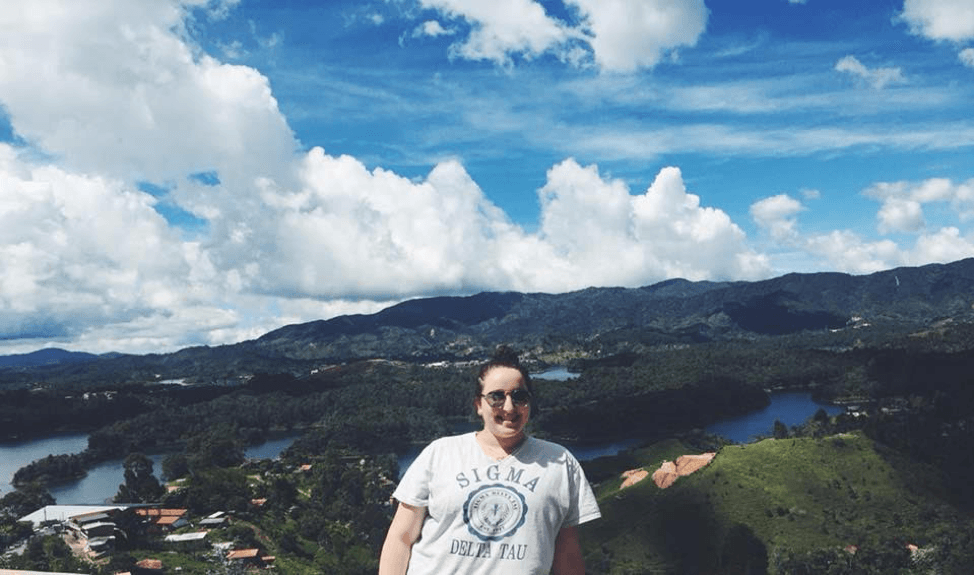For the first installment of Geography "In the Real World"-- where we showcase the accomplishment of GWU's Geography, Environmental Studies, and GIS students as they take their geographic education into real world work/study experiences-- we interviewed senior Geography major Sarah Cassius to talk about her experience this past summer interning for the Department of Environment and Urban Planning in Medellin, Colombia.
How did you first get involved in the geography department at GW? How are you involved now?
I started GW as a student in the Elliott School, concentrating in International Environmental Studies. I accidentally took 3 geography classes during the first semester of my Sophomore year to count toward International Affairs (GEOG 1001, 1002, and 1003) and loved them all. I realized that I was so passionate about what I was learning, which I didn’t feel in my previous Elliott classes, so I added on a double major and I strongly believe it was the best decision I’ve ever made.
What position did you hold this summer related to the field of geography?
I spent this summer in Medellin, interning for the smallest municipality in Colombia at the Department of the Environment and Urban Planning. They had recently acquired new land, were working on policies to ensure that it was protected and wanted to create a solid growth-expansion plan that protected their forested areas and watershed.
What were your responsibilities within that position?
While working with the urban planning subdivision, I used GPS technology and arcGIS to map every tree in the municipality (which is smaller than DisneyWorld), so they could spatially lay out which areas needed stricter conservation policies and plans, and which could be further developed. The municipality had just made the switch to LED lights for all of their public lighting, so one of my projects was to quantify the benefits of that change and present the economic, environmental, and public health benefits to the Mayor (in Spanish)! Lastly, the municipality has a river toward their border which runs through a slum. It was common knowledge that the nearby businesses and favela were polluting the nearby river, so my job was to interview people who lived in the favela about where they were dumping their sewage, and if they were dumping it into the river, to alert the department so they could connect them to plumbing. They were also so excited to show me their municipality, so I spent a lot of time hiking, meeting locals, going to conferences, and working in their community gardens.
What valuable skills did you learn there, and how has the experience shaped your thinking?
I learned so much about field work, and how detail-oriented and tedious it can be. I also learned about the importance of effective communication, because almost none of the people at my internship, or in the favela, spoke any English. The experience of living in a foreign country and not being a native speaker was so enlightening and challenging, and something I believe everyone should experience. I now have an increased sense of empathy when thinking about foreigners in the U.S and how they are treated, especially because I was treated so kindly in Colombia.
How did your previous experience in geographic education at GW prepare you for this opportunity?
So many of my geography classes helped to prepare me for Colombia. The semester before I left I took Geography of Latin America, in which we had a unit on Colombia’s history with the FARC, and how the country has transformed in recent years. I was able to utilize a lot of what I learned when talking to locals about the presidential election that took place while I was there and had a solid understanding of the physical geography of the region. I had also learned about Medellin’s incredible public transportation system in various Geography classes, and I geeked out when I had the opportunity to take the metro cable this summer. My GIS classes and physical geography classes were vital to completing the tasks I was presented with during my internship. My education was put to the test during my LED presentation I had to explain “bioaccumulation” and “gentrification” in Spanish to professionals in the field.
Have you completed a geography-oriented internship? Job? Study abroad? Ad-hoc field work? Independent research? Let us know! We are interviewing current (and past) GW Geography students who have taken their geography knowledge into the “real world.” If you are interested in sharing your experience, please send an e-mail to siofinnerty@gwu.edu



